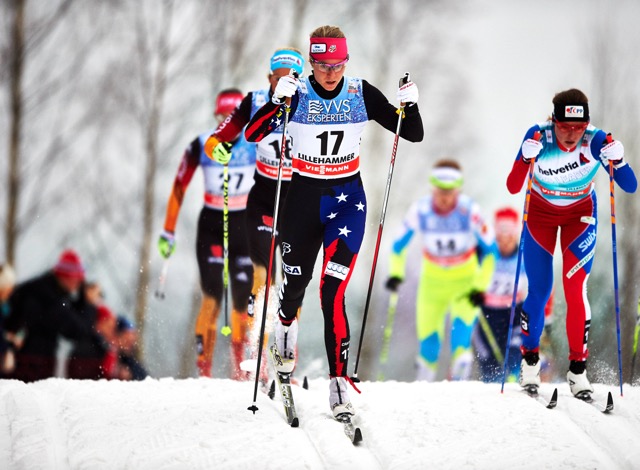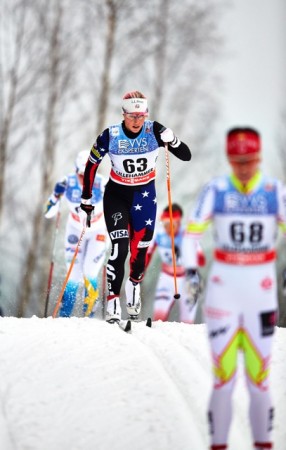
The Americans faced especially challenging competitors Sunday as the weekend’s World Cup mini tour wrapped up in Lillehammer, Norway. Under overcast skies and on firm tracks Norwegians dominated the on their “home” course, sweeping the top five spots in the men’s 15-kilometer classic pursuit and the first four spots in the women’s 10 k classic pursuit.
While the competition was tough, the U.S. Ski Team achieved victories of its own. This was especially true with Erik and Sadie Bjornsen, the American siblings who led their teammates in each of their respective races.
Erik Bjornsen started in 53rd place before reeling in 14 positions on an exciting course jam-packed with competitors, advancing to 39th place.
“It was really great, it was really fun,” Bjornsen said in a post-race phone interview. “It felt like a mass start. I was just skiing with guys the whole time… I went off with a decent group, and you could tell that everyone was just trying to chase that guy that was right in front of them.”
Meanwhile, Sadie Bjornsen gave the U.S. its best result of the day, starting in 17th before slipping one spot to 18th place in a tough field. Bjornsen was “in the mix,” according to U.S. Ski Team Head Coach Chris Grover, at times picking up spots, and at other times slipping. Bjornsen said that she had to recover from a “mini-explosion” after spending a kilometer skiing with Polish superstar Justyna Kowalczyk, who advanced 20 positions during the race.
Grover was very pleased with the both Bjornsens’ performance today and said that he was especially excited to see Sadie’s development and potential for the rest of the season.
“I think that the exciting thing for her right now is that she’s able to demonstrate that she’s just got all the skills – she’s skating well, she’s classicing well, she can sprint, she can race distance races – and that’s obviously why she put together a good tour here. But the more exciting thing is that I know she feels like she’s not in top form at all. So I think that really bodes well for later in the season,” he said in a post-race interview.
“I think that the exciting thing for her right now is that she’s able to demonstrate that she’s just got all the skills … But the more exciting thing is that I know she feels like she’s not in top form at all.” — U.S. Ski Team Head Coach Chris Grover, about Sadie Bjornsen
But the Bjornsens weren’t the only Americans to have strong results.
Liz Stephen started in 35th position and advanced to 29th during the race.
“She felt like she had really good skis and she was able to pick off a lot of people, especially on the big uphill, and she really felt like it was one of her better classic races that she’s had,” Grover said of Stephen’s race.
“I am happy with being able to finish the mini tour being in the points both distance days (for on the day results) and just sneaking in the overall points too,” Stephen wrote in an email.
Stephen wrote that as the tour progressed, she inched closer to her racing shape with each race. The weekend also gave her insight into changes she could make in future races.
“I have some serious work to do with conquering my downhill abilities and that is going to be a very necessary project to take on throughout the rest of the winter and certainly next training year,” she wrote.
One thing working in the favor of the American was their fast skis.
“I was a little worried when I was testing them,” Erik Bjornsen said of his skis, “because they had really good kick – I was kicking up every hill. I was worried it was gonna be a little slow but then when I got to the downhill it almost seemed like I had some of the fastest skis out there.”
Otherwise, it was a tough day for the Americans. Jessie Diggins fell from 21st to 44th. Diggins felt strong, according to Grover, but she couldn’t pull her technique together, and did not feel like she was skiing well.
“She was definitely dissatisfied with her event,” Grover said.
Kikkan Randall advanced from 63rd to 58th in what has been one of the toughest periods in recent memory for the American star. Randall has repeatedly said that she’s having trouble shifting into gear for racing this season.
“It was nice to start in a pack of skiers and have lots of people to ski with today,” Randall wrote in an email. “I got to put in another hard effort to bring me closer towards better race shape. I had some strong sections out there, especially climbing, and moved up a few places.”
“Kikkan was at times out there feeling good,” Grover said, “and she said that she’s starting to come into a little bit of race fitness, but that it’s just not there yet.”
Caitlin Gregg fell three spots from 65th to 68th, and Sophie Caldwell, who is still in the process of recovering from a broken elbow, used the race as a training exercise but still managed to advance from 84th to 71st.
“I felt pretty good the first 4 k, but then I faded quite a lot,” Caldwell wrote in an email. “My upper body got pretty tired and then the rest of it followed! I didn’t get to ski with a ton of people, but I just focused on hanging on and trying to keep my technique together once I started to get tired.”
Caldwell explained that the results she achieved this weekend were not ideal, but that she wasn’t expecting to drastically improve until she’s spent more time on snow and strengthen her upper body
Then, she wrote, it’s just a matter of “remembering how to race.”
The men’s team fielded two skiers Sunday – Bjornsen and Reese Hanneman – as both Simi Hamilton and Andy Newell sat out the race to rest for the upcoming classic sprint on Davos, Switzerland. In addition, Ida Sargent did not start for the women.
The lack of participation was especially felt after distance specialist Noah Hoffman broke his leg a week ago in Kuusamo, Finland, after a bad crash.
“It’s a huge bummer to have Noah have to go home, to be in that position,” Erik Bjornsen said of his teammate. “I mean, that kid is so strong, and has really strong work ethics; I really think he’ll bounce back pretty fast – a lot faster than people are expecting.

Despite the lack of the USST’s distance leader, Bjornsen said that he had plenty to learn from Newell and Hamilton in both distance and sprint races.
“It’s sweet to have Andy and Simi over here, because I can learn a ton from those guys – the distance races that they jump in they’re always super competitive. It’s still a great team, but we’re all missing Noah, that’s for sure.”
“It’s a long season.”
The attitude among the Americans seems to be one of looking forward.
Hanneman, the only other American man to race today, who finished a disappointing 92nd – last place, shared his perspective on the early-season races and what they meant.
“To be fair, these are the most competitive fields in existence.” Hanneman wrote in an email. “Unlike the Olympics or World Championships, the best countries all have an insane number of guys racing, due to it being a mini-tour, Nations Group spots, etc. And by definition these guys are in good form; they’re here racing because they just earned their spots in the various season openers. This explains some of it.”
Hanneman’s frustration with his results is palpable, suggesting that he may have over-trained during the summer and fall in anticipation of his first season starting on the World Cup.
“I don’t think I have any crazy expectations; I’m not expecting to hit a home run and throw up absolutely crazy results. I just want to perform to my capability. To be honest, I am really struggling. When you are suffering physically, you start to suffer mentally. I am not performing even close to what I am capable of,” he wrote.
Grover, when asked what his take-away was from the weekend as a whole, echoed a similar sentiment.
“Well, it’s challenging when you know that you’re not going to come into the season in top form as a team, and that’s part of your plan. It’s been part of our plan to target really skiing well in the middle of the season, and it’s hard to keep reminding yourself that that’s the plan when the results that you know are possible from a group like this aren’t possible right now.
Results: Men’s 15 k classic | Women’s 10 k classic



